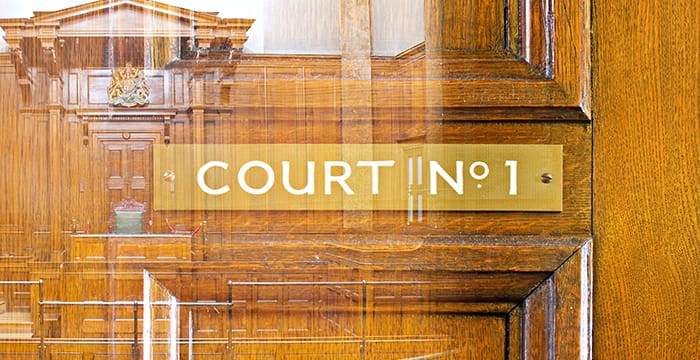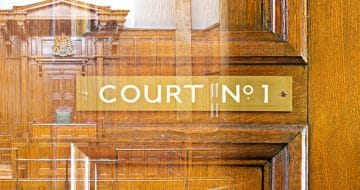Seeing law applied first-hand is an invaluable experience for aspiring lawyers, says law and history undergrad David Dee

As a first-year law student, I was called upon for jury service earlier this summer. I was eager to see how my limited legal knowledge would affect my experience. Likewise, the idea of seeing the law in practice, from the perspective of lay people, was something that equally fascinated me.
On my first day I was assigned to a jury at random via a computer. The jury I had been assigned to was very diverse, with many ethnicities and genders being represented. Diversity in a jury is critical as it is a way that beliefs from across the breadth of society can be represented in the justice system. Without these beliefs being represented, law would not serve society. There would be a significant disconnect between the values and ethics that the people want the law to exhibit, and what the law would actually enforce. Society is anything but static and as time progresses, demographics and values change, and these changes need to be shown in the criminal justice system. If there is a failure to do so, respect for the system will be lost.
However, the level of diversity in my jury was down to sheer luck. Assigning people to juries at random maintains integrity by avoiding positive discrimination but does not guarantee diversity. This could potentially alter the course of justice in a dramatic way. If there was a contentious legal issue present in a case and the members of the jury all came from very similar socio-economic backgrounds, then the verdict that they reach could be completely unrepresentative of general society. Although the chances of this are slim, it is nonetheless a possibility. In a case where a defendant is potentially facing the reality of a long custodial sentence, a lack of diversity in a jury has life-altering consequences.
Regrettably, the only other alternative to random selection would be positive discrimination. This should be avoided at all costs. Positive discrimination within a jury does guarantee diversity but brings entirely new problems. Minority groups in society would have to be present in a greater proportion of juries than what they actually represent in society. This then leads to the more established groups in society having their beliefs marginalised, despite forming a significant part of the population. Logistical problems are also present, as positive discrimination would mean consistently requiring individuals from minorities to serve on juries. This would greatly interfere with the everyday lives of these people, even if the views that they hold are the same as other groups.
The case which I served on a jury for concerned the defendant being charged with the offence of making threats to kill, contrary to the Offences Against the Person Act 1861. To use the judge’s words, this was not a complex case. I was excited to see how it developed as I had completed a criminal law module in the previous academic year that covered this offence. I felt confident in my understanding of what needed to be satisfied in both the actus reus and mens rea of the offence, in order for a guilty verdict to be reached.
What took me completely by surprise was that within the first ten minutes of the case starting, I had already begun to believe the defendant to be guilty. The first piece of evidence presented to the court I felt to be particularly compelling and (at least in my mind) satisfied both the actus reus and mens rea for the offence.
The judge directed myself and my fellow jurors in the appropriate manner throughout. Even with my limited experience, after being presented with the compelling first piece of evidence I sat there considering how the defense would counteract the prosecution? With the judge stating the simplicity of the case, I was intrigued as to what the remainder of the court session would consist of. I found the evidence presented therein focused on establishing the overall context of the situation, especially the relationship between the defendant and the person that they had allegedly threatened to kill.
The advocacy of the barristers was second to none. They were highly professional but in no way intimidating or condescending. These traits could also be used to describe the judge and all court staff I encountered. I’d been told numerous times about the reality of the law in practice at university and how (as a general rule) the media misrepresents it for entertainment purposes. Nevertheless, I was still amazed. The soft skills that the barristers displayed truly served the court and the course of justice. Without their professional conduct, the witnesses would not have been so forthcoming, neither would they have been able to express what they wanted to. It is invaluable for law students to see the law being applied first-hand. It gives you something to aim for, regardless of the path in law that you wish to pursue.
That being said, exemplary advocacy is a double-edged sword. In all cases, some evidence can be presented to the jury that do not directly deal with the actus reus or mens rea for the offence but instead establish the context. Establishing context is an absolutely essential component of a fair trial as well as to understand the relationship between the parties. However, barristers with exceptional oratory skill can place emphasis on certain facts of context that can be extremely convincing to the lay person.
I was in a position to constantly question myself and ask whether the evidence showed the actus reus or mens rea to be satisfied or not. This acted as a filter for me in reaching my verdict. It kept me focused on what was relevant and to the appropriate extent. I could appreciate the barristers’ fantastic advocacy but not be convinced by it alone. This ability to filter through evidence in court has undoubtedly come from my time studying law. Does this suggest that jurors should have some form of legal training? If so, does that undermine the entire point of having a jury consisting of individuals from outside the legal profession?
It was now time for myself and my fellow jurors to retire to consider our verdict. During deliberation it was clear that the brilliant advocacy of the defence barrister had a great impact on the lay people in the jury. His eloquent manner and delivery ensured that in a seemingly clear-cut case (in favour of the prosecution), the case for the defence was still very convincing to the lay person. The result of this was that us as a jury still took a whole day of deliberation, before a unanimous verdict of guilty was reached. If this had been a typical scenario-based question in a first-year criminal law seminar, then I’m sure a consensus of a guilty verdict in the group would have been found much sooner.
Even as a first-year student the dramatic implications of this were immediately apparent. It demonstrated to me the power of advocacy. Had circumstances been only slightly different (such as the composition of the jury) then the course of justice could have followed an entirely different path. This, in turn, raises further questions on a much broader scale. Does a jury fully understand the legal tests that should be applied? If a jury were to be provided with some form of legal training what would this consist of? Is it even practical to provide training to jurors?
The experience of serving on a jury as a first-year law student is an experience that cannot be underestimated. It gave me the chance to see how the law is applied on a day-to-day basis, enabling me to witness the sheer professionalism of legal professionals and the skills they exhibit. Not only does this inspire me in my continuing studies, it has also provided me with further points to reflect upon regarding juries in the legal system. For a first-year law student, seeing a case unravel in real life has been nothing but enlightening.
David Dee (pseudonym) studies law with history at a Russell Group university.
